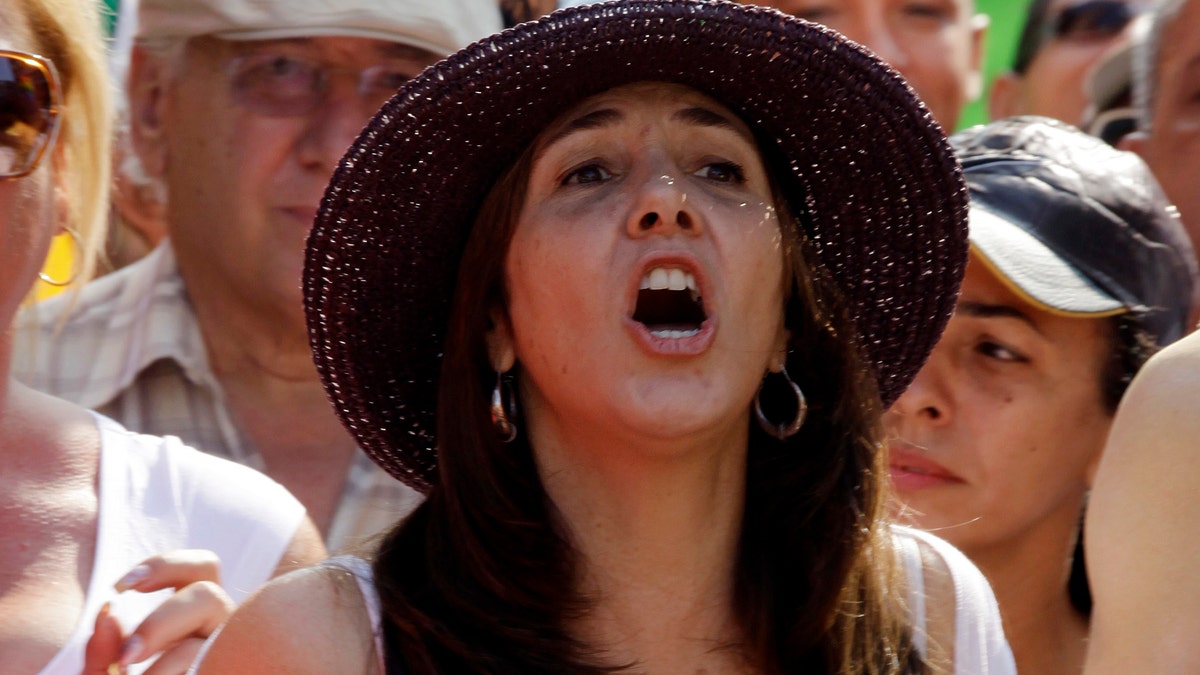
Mariela Castro, daughter of Cuba's President Raul Castro. (AP Photo/Javier Galeano) (AP2012)
The State Department has approved the visa of the Cuban head-of-state’s daughter to attend a conference in San Francisco, marking a shift in Cuban relations, which have been stuck in neutral since last year.
Mariela Castro Espín, a prominent advocate for LGBT issues in Cuba, will visit San Francisco next week to give a conference paper at the Latin American Studies Association. The State Department would not comment on Castro Espín’s visa, but Sen. Robert Menéndez (D-NJ) , who sits on the Foreign Relations Committee, said the visa had been granted.
Extending a visa to a Cuban official of Castro’s Espín’s stature to visit the United States as a private citizen is a rare occurrence. While Castro Espín is a well known expert on LGBT issues, she is also Raul Castro’s daughter and a government official who heads the Cuban National Center for Sex Education, or CENESEX.
“She’s not just some Cuban academic,” said Ted Henken, a professor at the City University of New York who studies Cuba and a member of the Latin American Studies Association. “She’s part of the dynasty.”
The visa approval drew criticism from Menéndez, a staunch opponent of the Castro government.
She's not just some academic, she's part of the dynasty
“Ms. Castro is a vociferous advocate of the regime and opponent of democracy, who has defended the regime’s brutal repression of democracy activists,” Sen. Robert Menéndez said in a statement. “Neither the United States government nor the Latin American Studies Association should be in the business of providing a totalitarian regime, like the one in Cuba, with a platform from which to espouse its twisted rhetoric.”
Menéndez also questioned whether Castro Espín qualified for a visa under Presidential Proclamation 5377, which prohibits granting non-immigrant visas to Cuban Communist Party members.
The State Department would not comment directly on her case but a spokesman told Fox News Latino that there is no blanket restriction on visas for Cuban officials.
Allowing Castro Espín to visit the United States shows the Obama administration’s interest in fostering a more open relationship, according to Chris Sabatini, policy director of the Americas Society.
“It’s a huge change,” Sabatini told Fox News Latino. “The U.S. government is clearly trying to demonstrate a new, more fluid relationship with some elements of the regime.”
Relations with Cuba, defined by a half century of stunted diplomatic relations and a trade embargo, have thawed under President Barack Obama, who has relaxed travel restrictions for Cuban Americans and increased the amount of remittances Americans can send to the island. The sentencing of U.S. contractor Alan Gross to 15 years in prison on charges of violating Cuban sovereignty last year derailed further diplomatic opening, however.
Sabatini viewed American willingness to allow Castro Espín’s visit a positive step, but said the U.S. government and civil society should press Cuba to loosen its own restrictions on allowing independent intellectuals to leave the country.
Cuba is one of the few countries that requires its citizens to solicit an exit visa to leave. The Castro government routinely denies such visas to independent intellectuals who criticize the government, like famed blogger Yoani Sánchez and economist Oscar Espinosa Chepe.
“I do think greater efforts should be placed on getting non-officials of any sort to be able to travel,” Sabatini said. “There needs to be a certain amount of reciprocity.”
Current U.S. travel policy toward Cuba is guided by the concept of “people-to-people” contacts, which aims to foster mutually beneficial contact between American and Cuban citizens.
An academic traveling to speak at a conference would ostensibly qualify, though the policy is not designed to accommodate high-ranking Communist officials like Castro Espín.
“She’s going to give the party line,” Sabatini said. “She’s not a scholar going to give a paper.”
Castro Espín’s trip to the United States comes on the heels of a visit from the official historian of the city of Havana Eusebio Leal, who gave a talk at the New York Public Library on Tuesday.
For the Latin American Studies Association, or LASA, Cuban delegations have long been a point of contention with the U.S. government.
When the State Department denied visas to the Cuban conference delegation during the George W. Bush years, LASA voted to hold its conferences outside of the United States to avoid the problem. The organization has since lifted the policy.
“There’s a whole book to be written about Cuba and LASA,” said Henken, who is an active member of LASA’s section on scholarly relations with Cuba. “I’m not sure how many people would read it, but there’s a lot of intrigue.”








































